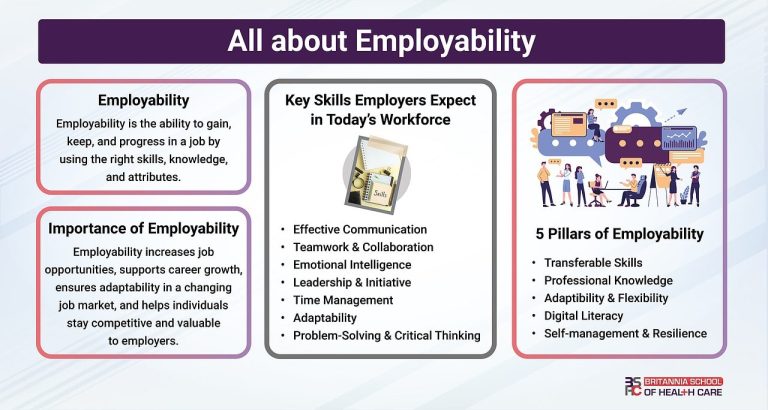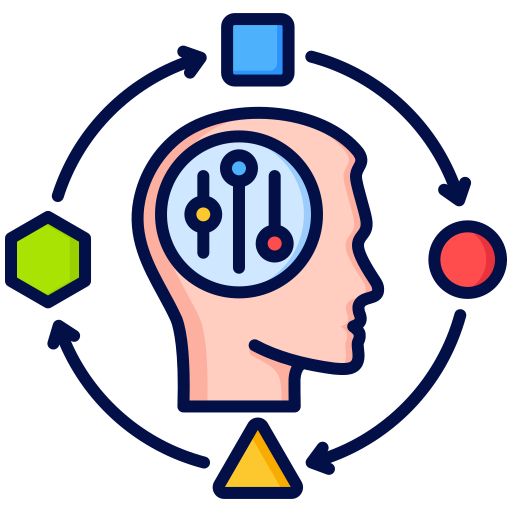In today’s fast-changing job market, employability has become a crucial factor that defines career success. It is no longer enough to simply hold academic qualifications or technical expertise, employers now look for candidates who bring a blend of knowledge, skills, and personal attributes that allow them to contribute effectively and adapt to evolving workplace demands.

Understanding Employability
Employability can be defined as the capability of an individual to gain employment, remain employable, and progress in their chosen career. It includes more than just technical expertise, it is about demonstrating the right mix of soft skills, adaptability, resilience, and willingness to learn.
Employability is essentially the bridge between education, skills, and workplace success. A highly employable individual is someone who can show employers that they have the potential to add value, perform effectively, and grow with the organisation.
Core Elements of Employability
To fully grasp the concept, it helps to break down employability into its key components:
Transferable Skills
These are universal skills such as communication, teamwork, leadership, and problem-solving that can be applied across different jobs and industries.
Professional Knowledge
Industry-specific knowledge and subject expertise remain essential. Employers want to see that candidates have the technical competence to perform their roles effectively.
Adaptability and Flexibility
In a world driven by technology and change, adaptability is one of the most valued employability traits. Professionals who can embrace change and quickly learn new systems remain relevant.
Digital Literacy
From basic IT competence to advanced digital tools, being digitally confident is a critical part of employability today.
Self-Management and Resilience
Employers appreciate individuals who are self-motivated, organised, and able to handle challenges without losing productivity.
Why is Employability Important?
The importance of employability extends beyond simply getting a job, it has long-term benefits for individuals, organisations, and the economy.
Better Job Prospects
Candidates who showcase strong employability skills are more attractive to employers. They stand out in interviews, perform well in assessments, and are more likely to be offered roles.
Career Progression
Employability is not only about the first step into employment, it also influences promotions, leadership opportunities, and salary growth. Employers reward individuals who can contribute consistently and adapt to new challenges.
Security in a Changing Job Market
With industries constantly evolving due to technology, automation, and globalisation, employability ensures career resilience. Those who keep improving their skills are better equipped to switch roles or industries if required.
Organisational Success
For businesses, hiring individuals with strong employability skills means creating a workforce that is motivated, innovative, and capable of driving success.
Lifelong Learning and Growth
Employability encourages individuals to see learning as a continuous journey. This mindset ensures that they remain relevant and future-ready in their careers.
What Skills Do Employers Value the Most?
Employers consistently highlight a few key skills that they look for in every candidate:

Effective Communication – Both verbal and written clarity are essential.

Teamwork and Collaboration – Ability to work productively with others.

Problem-Solving and Critical Thinking – Finding solutions and making informed decisions.

Leadership and Initiative – Taking responsibility and motivating others.

Time Management – Meeting deadlines and balancing tasks efficiently.

Adaptability – Thriving in changing environments.

Emotional Intelligence – Understanding and managing emotions in the workplace.
How to Improve Your Employability
Employability is not fixed, it can be developed and improved through conscious effort. Here are some practical ways:
Gain Work Experience
Internships, volunteering, and part-time jobs help build practical skills and give you an edge in the job market.
Develop Soft Skills
Take every opportunity to practice communication, leadership, and teamwork, whether in professional or personal settings.
Invest in Continuous Learning
Pursue training, certifications, and workshops to keep your knowledge current and relevant.
Build Digital Competence
In the era of automation and artificial intelligence, digital literacy is not enough—employers value candidates who can understand, use, and adapt to AI-powered tools. Learn how to:
- Use AI for productivity (e.g., project management, data analysis).
- Understand AI’s role in your industry.
- Upskill with online courses in AI, data literacy, and digital transformation.
Grow Your Professional Network
Networking opens doors to new opportunities, mentorship, and industry insights.
Reflect and Adapt
Regularly assess your strengths and weaknesses, seek feedback, and adjust your career development plan accordingly.
Final Notes: Employability and the Future of Work
The nature of work is changing rapidly with automation, artificial intelligence (AI), and digital transformation. Jobs that exist today may not exist tomorrow, while entirely new roles, many driven by AI are emerging. In this context, employability becomes more important than ever. Employers seek professionals with technical knowledge, adaptability, creativity, and resilience along with the ability to understand and use AI-powered tools.
Lifelong learning, digital literacy, AI awareness, and a proactive mindset will remain key to future employability, helping individuals stay relevant and competitive in a workforce reshaped by technology. In short, employability is not something you achieve once, it is an ongoing journey of growth, learning, and self-improvement.

